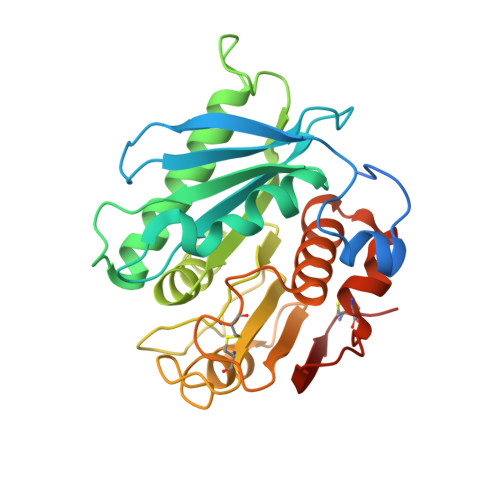Concentration-Dependent Inhibition of Mesophilic PETases on Poly(ethylene terephthalate) Can Be Eliminated by Enzyme Engineering.
Avilan, L., Lichtenstein, B.R., Konig, G., Zahn, M., Allen, M.D., Oliveira, L., Clark, M., Bemmer, V., Graham, R., Austin, H.P., Dominick, G., Johnson, C.W., Beckham, G.T., McGeehan, J.E., Pickford, A.R.(2023) ChemSusChem 16: e202202277-e202202277
- PubMed: 36811288
- DOI: https://doi.org/10.1002/cssc.202202277
- Primary Citation of Related Structures:
8AIR, 8AIS, 8AIT - PubMed Abstract:
Enzyme-based depolymerization is a viable approach for recycling of poly(ethylene terephthalate) (PET). PETase from Ideonella sakaiensis (IsPETase) is capable of PET hydrolysis under mild conditions but suffers from concentration-dependent inhibition. In this study, this inhibition is found to be dependent on incubation time, the solution conditions, and PET surface area. Furthermore, this inhibition is evident in other mesophilic PET-degrading enzymes to varying degrees, independent of the level of PET depolymerization activity. The inhibition has no clear structural basis, but moderately thermostable IsPETase variants exhibit reduced inhibition, and the property is completely absent in the highly thermostable HotPETase, previously engineered by directed evolution, which simulations suggest results from reduced flexibility around the active site. This work highlights a limitation in applying natural mesophilic hydrolases for PET hydrolysis and reveals an unexpected positive outcome of engineering these enzymes for enhanced thermostability.
Organizational Affiliation:
Centre for Enzyme Innovation, School of Biological Sciences, Institute of Biological and Biomedical Sciences, University of Portsmouth, Portsmouth, PO1 2DY, United Kingdom.















